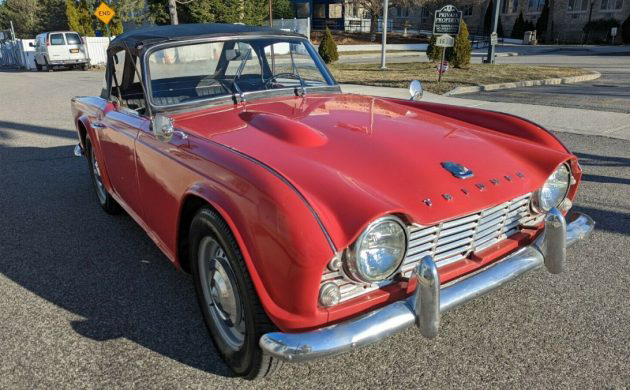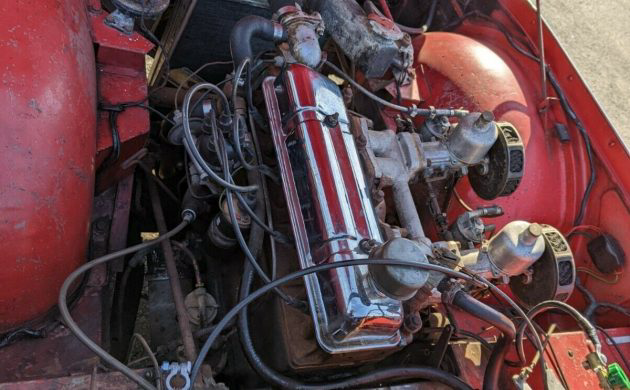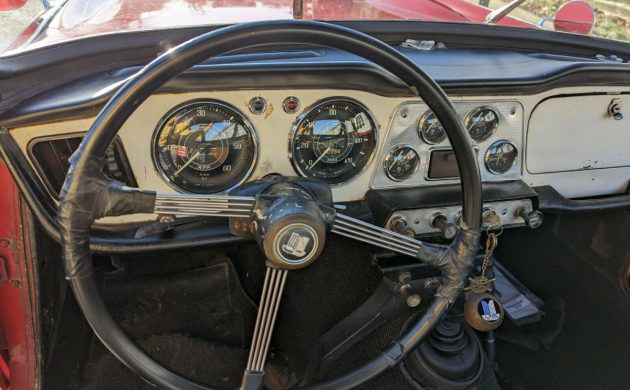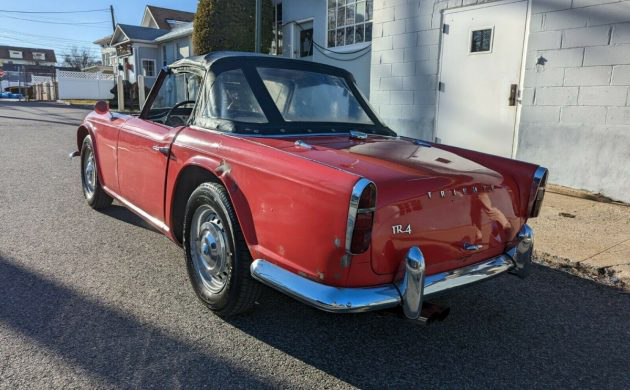At the dawn of the 1960s there was no way to know of the massive social upheaval the close of the decade would bring– unless, perhaps, you traded in tea leaves and crystal balls for steel and rubber. As we transitioned from the Atomic Age to the Space Age, the curves and tailfins that dominated the American designs of the ’50s were quickly abandoned as materials, technology, and customer expectations underwent rapid change. British marques were not immune to this automotive revolution, and in 1961 the Triumph TR3 would grudgingly begin to yield the stage to its successor, the TR4. This TR4 is an example from that very first year. Located in New York City– more specifically, The Bronx– it’s advertised here on eBay. Buy It Now is set at $10,000, or you can make an offer.
In terms of design, Giovanni Michelotti’s TR4 was a radical departure from the TR3– perhaps even more of a departure than the TR2 had been from Triumph’s postwar offerings. Doors rose, distinct curving fenders faded into the more squared-off bodywork, and the grille expanded to encompass even the headlights. Compared to the styling, the changes to the engineering were more incremental. While the new car kept the TR3’s inline four cylinder engine, originally derived from the powerplant of a Ferguson tractor, displacement was increased to 2,138 cc. This increased power dramatically, with the engine making 104 bhp. This, in turn, granted the car a top speed in excess of 100 mph and contributed to the TR4 winning its class at Sebring in its debut year.
Safety and comfort also benefited from renewed focus. The TR4 received honest-to-goodness roll-down windows. For the first time, Triumph offered synchromesh on all four gears, with electronic overdrive as an option. The Surrey top attempted to address the shortcomings of a folding fabric roof by offering a system consisting of a fixed back glass with roll bar and a removable center roof panel– a system that Porsche would bring to market as the Targa top five years later. Brakes remained discs up front and drums in the back.
From the photos this little red convertible looks to be fairly solid. The seller has provided us with pictures of the undercarriage, and while there is surface corrosion, there doesn’t seem to be any gaping holes. While the frame looks a little uneven up front, that could be just the angle of the photo. The body could use some attention, particularly the driver’s side rear fender, which has a nasty dent, but here, too, there’s a lot to be said for a relatively rust-free beginning. Sadly, there isn’t much to be said about the interior: the single photo reveals a very nice dash and a very taped steering wheel, so the state of the upholstery, door cards, and carpet is anyone’s guess. All together, though, if you’re in the market for a classic British roadster, this one may be well worth a closer look.








My favorite Triumph. Good looks, good power, good fun.
To be correct, the Ferguson tractor engine was developed from the Standard-Triumph Vanguard engine, a saloon car, which was strong, torquey and infinitely rebuildable due to its wet cylinder liners, just what the English farmer of the day needed. Chicken or egg? It was a car engine first, became a tractor engine from that beginning, and continued as a car engine in the TR series through the TR4A. It was even used in some Morgans and TR based specials like the Swallow Doretti, Peerless GT, Italia and a number of other low volume cars. It did not begin its life as a tractor engine.
One benefit of the relationship between Ferguson and Standard was the starter for my Midget 1500 is shared with the tractor.
The upside to this was the part was much cheaper and immediately available ordering it from the local tractor shop than getting it through MOSS.
Not knocking MOSS. I rely on those guys, but I now check with the farm suppy first when I need parts for my MG.
Obviously, I’d want to look it over very closely and drive it before committing to a purchase (which, sadly, I’m not able to do at the moment!), but this appears to be a pretty “correct” early car, mostly pretty well cared for, through times when the car was worth relatively little, parts were getting harder to find, and clubs such as VTR and TRA had yet to be established. If it matters to a new owner, “incorrect details” such as wrong seats and incorrectly placed TR4 badge on the trunk lid are easily fixed; otherwise, one could just maintain and DRIVE a car like this for years to come and not be too ashamed to do so. (Or, [over]restore it if you must! ;) )
This car looks pretty good. This and the ’62’ I once had would have the short bulge hood bump.
The front end caps of the outer rockers look pretty good, but the outer rocker on the passenger side is questionable.
The inners (rockers)from the picture underneath seem to be in good shape. The center section and rear section (deck) looks a little wavy.
Overall the car looks good, I wonder when it was repainted ? Since I have working on my ’64’ I have been watching the market on TR4’s.
If all the work he describes has been done well, this could be a good buy for someone.
GLWTS !!